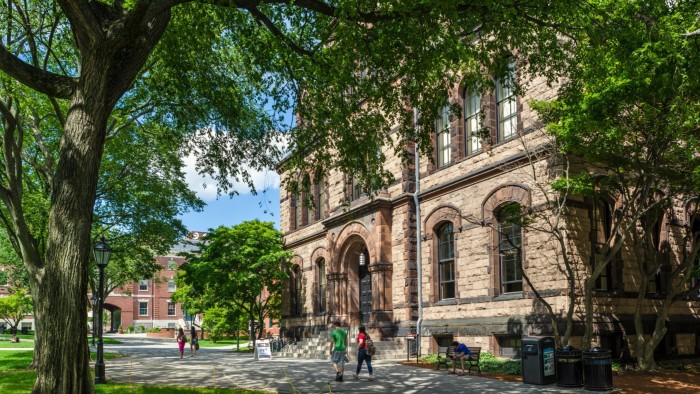Unlock the White House Watch newsletter for free
Your guide to what Trump’s second term means for Washington, business and the world
Republican lawmakers have escalated their confrontation with elite US universities by issuing subpoenas to the presidents of two Ivy League schools they allege have colluded on tuition fees.
The judiciary committee in the House of Representatives issued subpoenas on Tuesday to the heads of Brown and the University of Pennsylvania, demanding they surrender documents by July 22.
The committee opened a probe into collusion earlier this year and requested documents in April, but described the universities’ responses to be “inadequate”.
The lawmakers also issued a subpoena to Harvard last month and have sought information from Columbia, Dartmouth, Cornell, Princeton and Yale, all Ivy League institutions.
The congressional inquiry adds a new layer of pressure on the universities, which are embroiled in a deepening stand-off with President Donald Trump’s administration.
It has already cut federal research funding, demanded changes to leadership and governance, and threatened to restrict universities’ ability to enrol international students.
Trump has claimed universities such as Harvard and Columbia failed to control antisemitism on their campuses, in particular during pro-Palestine protests in recent years.
Critics of the administration say Trump is cracking down on free speech at universities and eroding academic freedom, and that cuts to funding will compromise American research and development.
House judiciary committee chair Jim Jordan and Scott Fitzgerald, a Republican House member who chairs a judiciary subcommittee, said Ivy League universities appeared to be “collectively raising tuition prices while engaging in perfect price discrimination”.
The latest probe could lead to legislation, investigations by regulators and public hearings, echoing those that took place to examine alleged antisemitism on campuses after Hamas’s attack on Israel on October 7 2023.
Those hearings triggered widespread public criticism and led to the resignations of the presidents of the University of Pennsylvania, Harvard and Columbia.
Republicans have raised concerns about soaring higher education costs and about fair access since the Supreme Court outlawed positive discrimination in admissions in 2023.
However, Phillip Levine, a professor of economics at Wellesley College, who studied college pricing, said that the Ivy League was not engaged in anti-competitive pricing.
“It would be an odd form of collusion,” he said. “Highly endowed private institutions charge the lowest prices to low- and middle-income students and provide them very high-quality education.”
Brown said it had “consistently co-operated” with the investigation despite “the exhaustive nature” of the requests and the need to redact some personal details about students in line with federal law.
The University of Pennsylvania said it had “promptly and consistently” engaged with the committee, including providing thousands of pages of documents and would continue to co-operate with the probe.
It has also been in a dispute with the federal government over a trans athlete’s participation in women’s sports. On Tuesday, the government said the Philadelphia-located university had agreed a number of steps to resolve its alleged civil rights violation.
Harvard did not immediately respond to a request to comment.
Read the full article here




